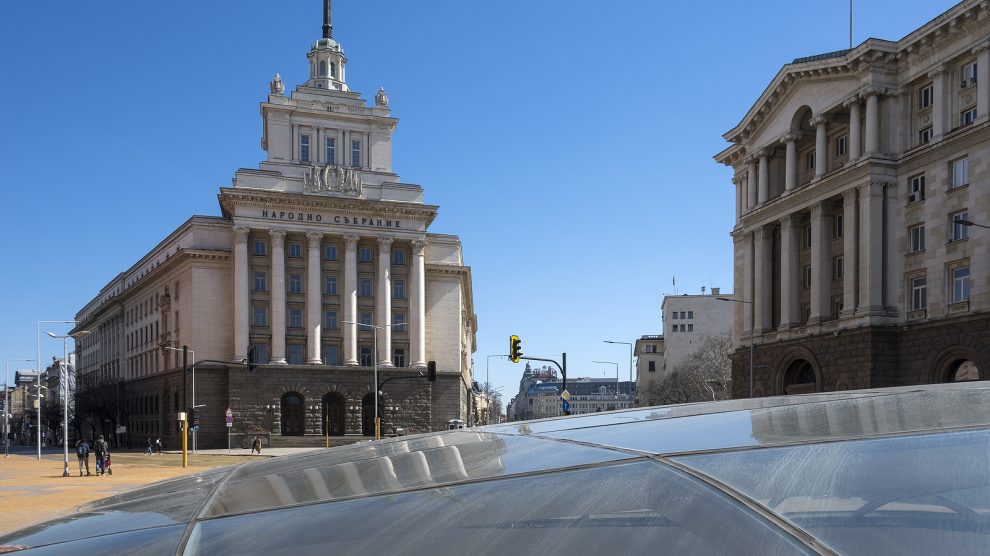Long caught in a seemingly never-ending spiral of inconclusive parliamentary elections, Bulgaria’s largest parties appear to have found a compromise that will allow them to form a government: rotating prime ministers.
Bulgaria’s two largest political parties, the centre-right GERB and an anti-corruption bloc led by We Continue the Change and Democratic Bulgaria (PP-DB), agreed on May 22 to form a government in a bid to end years of political deadlock.
The agreement marks a change in direction for PP-DB, which had consistently stated that it would never work with GERB.
- Five elections and counting, is there an end in sight to Bulgaria’s political stalemate?
- The end of emerging Europe’s involvement in Russia’s ‘opaque’ development bank
- Inflation, a new East-West divide
The country has held five parliamentary elections since 2020, when the government of GERB leader Boyko Borissov collapsed. No country in Europe has ever voted as frequently in such a short space of time. The electoral merry-go-round had done little for Bulgaria’s economy nor for its two key foreign policy goals: membership of the border-free Schengen area and adoption of the euro single currency.
Bulgaria’s bid to join Schengen was vetoed in December 2022, while in February, the country dropped its goal of adopting the euro by January 2024. There is also a risk that without a stable government will full executive powers, Bulgaria will miss out on EU Recovery Plan funds.
The country is also still trying to join the Organisation for Economic Co-operation and Development (OECD).
GERB, which ruled Bulgaria for a decade before 2021, narrowly won the last parliamentary election on April 2, and proposed former European Commissioner Mariya Gabriel as its candidate for prime minister in place of Borissov, whose time in office was characterised by perceived widespread corruption.
However, as part of the agreement between the parties, Gabriel, who resigned her Commission post – she had overseen EU innovation, research, culture, education and youth policy – on May 15, is likely to serve initially as deputy PM to the PP-DB’s Nikolay Denkov, a former education minister. The two will then rotate jobs next year.
“PP-DB will propose a government that can implement a constitutional reform, fulfil all the requirements related to the country’s full membership in the EU as well as implement comprehensive judicial reform,” Denkov said on May 22, also suggesting that his bloc had been left with little choice.
“The situation is extremely difficult,” Denkov said. “After five elections in a row, we have difficulty forming a regular cabinet and there is a real danger of going to the next election in a row with no clear result.”
‘Not a coalition’
Working with GERB is likely to be highly unpalatable for some PP-DB voters. On May 23, Kiril Petkov, a former prime minister and one of We Continue the Change’s leaders, apologised to voters for the coalition deal.
“If our friends and voters felt terrible about this fact, I apologise,” he said, later adding that the government would not be a coalition, but two parties sharing power. He also vowed to carry out PP-DB’s election promise to tackle corruption.
“If the choice is turning a blind eye to corruption or seeing the government collapse, then the government will collapse,” he said.
Borissov, the GERB leader, appeared to be equally unhappy with the deal but asked Bulgarians to back to the new government, suggesting, like Petkov, that the country had little choice.
“The [coalition] agreement has been concluded…because it is clear to everyone that the last two years have been marked by chaos, misery, migration and inflation,” he said on May 23, adding: “I salute everyone who has the courage to get the country out of this total chaos. This is responsible behaviour of diametrically opposed parties.”
The first task of the new government – which it is hoped will be in place by the end of this week – will be to approve the country’s budget.
“If we have no government there can be no budget,” said Petkov on May 24.

Slowing growth
Bulgaria’s economy is expected to slow down substantially in 2023 – to 1.5 per cent. According to the World Bank, growth may be further suppressed if Bulgaria fails to deliver on its milestones under the National Recovery and Resilience Plan, resulting in a freeze or reduction of upcoming EU Recovery Plan funds, and depriving the country of substantial investment resources.
The long-term structural challenges facing Bulgaria include negative demographic trends, coupled with institutional and governance weaknesses. Institutional gaps have been mirrored by suboptimal public service delivery, hindering private sector expansion, and undermining inclusive growth and shared prosperity.
High rates of inequality of opportunity limit access to key public services, constraining the ability of individuals to escape poverty and thus leading to persistently high-income inequality. Poverty and inequality are reinforced by inadequacies in the targeting, coverage, and generosity of the social security system, limiting its role as a redistributive mechanism.
Unlike many news and information platforms, Emerging Europe is free to read, and always will be. There is no paywall here. We are independent, not affiliated with nor representing any political party or business organisation. We want the very best for emerging Europe, nothing more, nothing less. Your support will help us continue to spread the word about this amazing region.
You can contribute here. Thank you.


